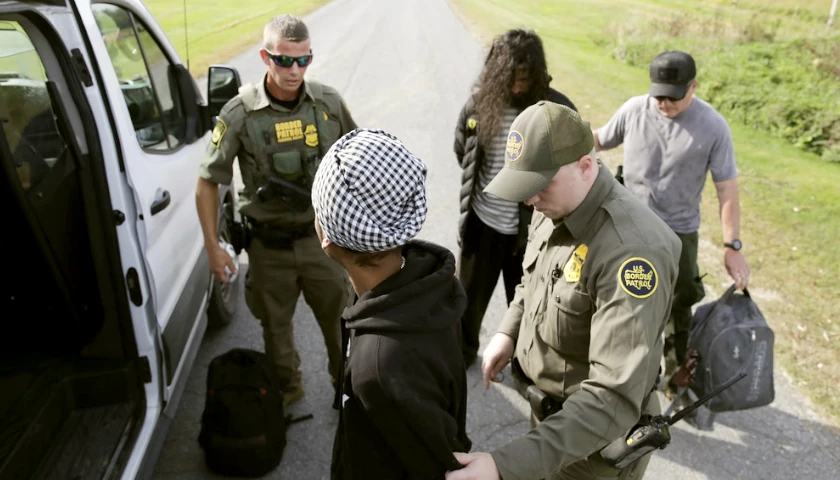More than one year after the November 2020 presidential election, Fulton County election officials are offering conflicting accounts about whether video recordings, used to surveil drop boxes where absentee ballots were deposited in the November 2020 presidential election, have been destroyed and whether their actions comply with federal law that requires retention of all election records for 22 months.
The video recordings that may no longer exist would have monitored drop boxes during the time period in which more than 60,000 absentee ballots were deposited into Fulton County drop boxes over the majority of 36 days of the maximum 49 days when drop boxes were allowed to have been deployed for the November 2020 presidential election.
A State Election Board Emergency Rule 183-1-14-0.8-.14 promulgated in July 2020 allowed Georgia’s 159 county election officials to set up drop boxes for voters to deposit their absentee ballots. At that time, there was no state law authorizing the use of drop boxes for absentee ballots.
Secretary of State Brad Raffensperger served as the Chairman of the State Board of Elections at the time the Emergency Rule was promulgated. The enactment of the March 2021 State Election Integrity law removed the Secretary of State from the Board.
Across the state, a little more than 300 drop boxes were deployed as depositories for absentee ballots for many as 49 days leading up to the general election beginning as early as September 15, 2020 and ending on November 3, 2020, as authorized in Paragraph 3 of the Emergency Rule.
An estimated 600,000 ballots placed in drop boxes were counted in the November 2020 general election, in which five million total votes were cast. Joe Biden was certified the winner by a margin of less than 12,000 votes.
In Fulton County, 38 drop boxes were deployed for the collection of absentee ballots during the 2020 presidential election over a 41-day period beginning September 24 and ending November 3, 2020. According to Fulton County records, approximately 78,000 absentee ballots were placed in these 38 drop boxes, transferred to the Fulton County registrar, and counted in the 2020 general election.
Paragraph 4 of the Emergency Rule requires the use of a video recording device to monitor each location “continuously.” Paragraph 5 stipulated that the recordings must be retained by the county for 30 days after final certification of the election or until conclusion of any contest, whichever is later.
Just the News revealed last month that as Raffensperger said he was starting an investigation into illegal ballot-trafficking during the November 2020 presidential election and January 2021 U.S. Senate run-off, absentee ballot drop box surveillance video recordings had already “vanished” from some Georgia counties, including Fulton.
Raffensperger’s ballot-trafficking investigation stems from three official complaints regarding the November 2020 election submitted by election integrity group True the Vote to Georgia’s Secretary of State’s office. The complaints followed a year’s worth of research and analysis of absentee ballot drop box video recordings and geolocation data from cellphones of more than 200 ballot traffickers depositing ballots into drop boxes around the state, usually during overnight hours.
According to the report, Fulton County Senior Public Manager Officer Regina Waller told Just the News regarding the status of the drop box video recordings, “I was informed that the videos were only required to be kept for 30 days post-election.” Waller added, “Please see bullet point number five of the attached SEB Rule regarding Elections in Georgia.”
“Video of people dropping ballots into drop boxes are not election records and are governed by the SEB rule,” Waller also told Just the News.
The Georgia Star News emailed Waller and asked for, among other information, the official disposition of the absentee ballot drop box video recordings from the November 2020 election.
“[I]t was never stated that the video camera recordings were discarded,” Waller responded.
She went further, telling The Star News that Fulton County was complying with federal law and not the State Election Board emergency rule.
“Fulton County does keep all election records for the 22 months specified by law,” Waller stated.
When pressed on her previous quote to Just the News, Waller said, “The entire original statement to the publication you are pulling your information from was not used.”
After further email exchanges, Waller wrote, “Fulton County does have the absentee ballot drop box video recordings from the November 2020 general election per the 22 months specified by law. The county has and always will remain in compliance with federal and state laws and rules regarding all elections matters.”
Waller’s statement, however, contradicts other sources to The Star News who had made their own independent open records requests to Fulton County for the video surveillance footage from the absentee ballot drop boxes for the entire early voting to election day period of the November 3, 2020 presidential election.
In response to one open records request for video recordings from the 38 drop boxes for the 41-day period beginning September 24 and ending November 3, 2020, Fulton County told the requestor those recordings were only available for a seven-day period from October 30 to November 5, 2020.
When asked why there were no video recordings for the 38 drop boxes from the earlier 36-day period between September 24 and October 29, 2020, Fulton County officials said they had no explanation, but that the video recordings do not exist.
After researching and evaluating other election records to pare down his open records request for the absentee ballot drop box video recordings, Gwinnett County resident David Hancock attempted in July 2021 to set up a date to view videos from three specific early voting dates of October 1, 9 and 10, 2020. Hancock was told the videos were not available.
“Unfortunately, we do not have video available for the specific dates as requested,” Fulton County’s IT Networks and Operations Manager Gregory Crayton advised Hancock on July 20.
When asked the dates for which absentee ballot drop box video recordings were available, on July 21 Crayton gave Hancock dates that covered only 8 days.
“I believe the dates currently available are 10/29/20 – 11/5/20 … I will be [sic] need to verify to be absolutely sure …”
When Hancock confirmed on July 22 that he wanted Crayton to verify the dates for which the video recordings were available, Hancock received an automated out-of-office message in response. That was the last communication from Fulton County regarding Hancock’s still outstanding open records request.
A later request Hancock entered in Fulton County’s online open records request system on October 26 currently shows the request status as “No Records Exist.”
In both of these cases, Fulton County gave the requestors similar dates for which video recordings were available. Interestingly, Fulton County also advised both requestors that they had video recordings of the absentee ballot drop boxes for November 4 and 5, neither of which were voting days for the November 2020 presidential election.
According to Fulton County’s absentee ballot drop box transfer forms reviewed by The Star News, more than 60,000 of the approximately 78,000 ballots collected from drop boxes were deposited in the 34-day period between September 26 and October 30, 2020, for which the video surveillance recordings may no longer exist.
From nearly 1,000 absentee ballot drop box transfer forms provided directly by Fulton County and published here, The Star News calculated that approximately 54,000 ballots deposited into the drop boxes across the county throughout the September 26 to October 30 portion of the November 2020 early voting period, for which Fulton County officials have stated the drop box video recordings are still available, with the exception of October 7, 9, 10, 11 and 20.
The transfer forms for the five dates of October 7, 9, 10, 11 and 20, which The Star News repeatedly requested, were denied. The Star was later told by a Fulton County election official that they were missing.
However, through a separate open records request to the Georgia Secretary of State’s office, The Star News further determined that absentee ballots deposited into drop boxes during those previously mentioned five days for which Fulton County may not have the video recordings totals around 9,900 ballots.
All told, the 54,000 ballots deposited from September 26 to October 30 plus 9,900 deposited on October 7, 9, 10, 11 and 20, equals more than 63,000 of the estimated total 78,000 drop box absentee ballots – or about 80 percent of the total – for which Fulton County may no longer have the required surveillance video recordings.
While the State Election Board Emergency Rule may have required that the video recordings of the drop box location be retained by the county for only 30 days after the later of final certification of the election or conclusion of any contest involving an election, the Emergency Rule does not comport with federal law.
Under The Civil Rights Act of 1960 codified as 52 U.S.C. 20701-20706, the requirement is that election officers retain and preserve all records and papers for any federal election for a period of 22 months from the date of a general, special or primary election involving candidates for the office of president, vice president, presidential elector, member of the U.S. Senate or member of the U.S. House of Representatives.
U.S. Attorney General Merrick Garland, on July 28, 2021, issued a guidance to elections officials, reminding them how they “must comply with federal law when preserving and retaining election records and the criminal penalties associated with the willful failure to comply with those requirements.”
Phill Kline, founder and director of election integrity group The Amistad Project, told The Star News that Garland’s guidance is that election materials “extend beyond ‘papers’ to include other ‘records.’ Jurisdictions must therefore also retain and preserve records created in digital or electronic form.”
Kline added that Merrick’s statement addressing the definition of records that need to be maintained includes video recordings of drop boxes. Kline said he believes the destruction of videos prior to the 22-month post-election period is in conflict with federal law, “unless there is another interpretation of what is an ‘election record’ or they are playing some semantic game of trying not to be forthright.”
Anyone who willfully fails to comply with the retention and preservation requirements of the Act or willfully steals, destroys, conceals, mutilates, or alters any record or paper, Garland’s guidance warned, “is subject to federal criminal penalties,” and “can face fines of up to $1,000 and imprisonment of up to one year for each violation.”
– – –
Laura Baigert is a senior reporter for The Star News Network, where she covers stories for The Georgia Star News and The Tennessee Star.
Photo “Downtown Atlanta” by David CC BY 2.0.






[…] In the months leading up to the 2020 election, Vote at Home helped at least 37 states hastily adopt vote-by-mail systems, including the Atlanta suburb of DeKalb County. It helped the Mark Zuckerberg-funded Center for Tech and Civic Life set up private drop boxes in key Democratic cities, many of which weren’t properly surveilled. […]
Were 600,000 ballots placed in dropboxes as is stated in paragraph 6; or were 60,000 ballots placed in dropboxes as is stated in the title.